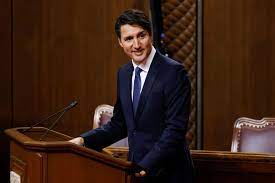
OTTAWA, Aug 15 (NNN-AGENCIES) — Canadian Prime Minister Justin Trudeau is expected to call snap elections for Sept 20 to seek a new mandate to steer the nation’s pandemic exit, much to the dismay of his rival parties.
In office since 2015, Trudeau and opposition leaders have been crisscrossing the country in recent weeks making election-style announcements in anticipation.
On Sunday, he will visit the governor general to ask her to dissolve parliament, triggering a general election that polling shows is likely to return his Liberals to power.
Despite rolling out massive pandemic aid, passing a federal budget and other key legislation with opposition backing over the past year, Trudeau has lamented that parliament in recent months has become dysfunctional, with a “level of obstructionism and toxicity in the House that is of real concern.”
Opposition leaders disagreed, while warning that it’s too soon to be charting a path out of the pandemic when Covid-19 infections are once again surging nationwide following a summer drop that resulted in most public health restrictions being lifted.
All five parties with current seats in parliament are gearing up for a fierce battle at the ballot box.
“Justin Trudeau’s planning an election in the middle of a pandemic because he’s focused on politics,” tweeted Trudeau’s main challenger, Conservative leader Erin O’Toole.
“It’s time we had a prime minister planning an economic recovery focused on Canadians,” he added. “We’re ready.”
Most Canadians approve of Trudeau’s pandemic response. But if a fourth wave of Covid-19 infections strikes during the campaign, it could sink his backing.
Despite rising vaccination rates that are among the highest in the world — with almost 62 percent of Canadians fully inoculated — nearly 1,000 new daily Covid-19 cases have been reported across Canada recently.
A spike in hospitalizations led Alberta — the first Canadian province to fully lift pandemic restrictions last month — to reintroduce coronavirus testing and mandatory quarantines for infected persons on Friday.
Trudeau was reelected to office in 2019 but lost his majority in his second term, amid scandals.
To regain a majority on Sept 20, the Liberals must win at least 170 of the 338 seats in the House of Commons, up 15 seats from its current standing.
According to a recent Abacus Data poll, the Liberals are in striking distance of a majority, with 37 percent of support.
The Conservatives and the leftist New Democrat Party — which propped up the Liberals until now and has seen an uptick in support — trail on 28 percent and 20 percent, respectively.
According to analysts, the Liberals have a good shot at winning a majority, while “the chances that the Conservatives will come out in front, even securing a minority government, are slim,” said politics professor Stephanie Chouinard at the Royal Military College in Kingston, Ontario.
O’Toole, meanwhile, has struggled to find his footing since becoming leader of the Conservatives in August 2020, as lockdowns and other public health measures put glad-handing out of reach.
In March, he found himself painfully at odds with his rank-and-file after telling a party convention that a robust plan to tackle climate change was needed if the Conservatives ever hoped to unseat Trudeau. Members instead voted down a resolution that said “climate change is real.”
O’Toole is the third Conservative leader in six years to challenge Trudeau in general elections.
The New Democrats, led by Jagmeet Singh and ranked fourth behind the separatist Bloc Quebec, have never ruled Canada, but are hoping to woo progressive voters from the Liberals and move up in the rankings.
The Greens, who lost one of only three seats in parliament when an MP crossed the floor in June to join the Liberals, have been embroiled in a nasty internal power struggle.
Campaigning is to last only 36 days, and is largely expected to revolve around pandemic management, the government’s broad emergency aid programs, and a three-year CAN$101.4 billion post-pandemic stimulus plan. — NNN-AGENCIES








